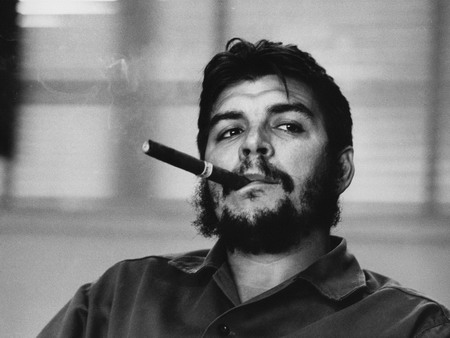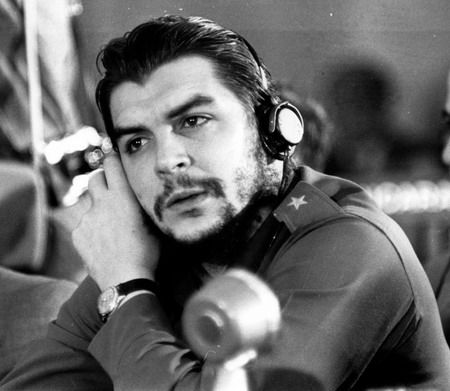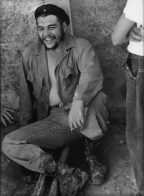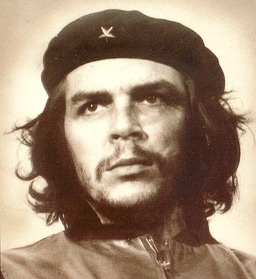
When the “breaking news” stories reached to the world, about Ernesto “Che” Guevara being killed on the mountains of Bolivia by a team of filthy assasins, I was just six years old – completely unaware of what a dirty and knave world we lived in. I neither had heard Che’s name, nor had any ideas about socialism, revolution and a struggle for a free and peaceful world. The only thing I can remember is the sorrow on my parents’ faces when they heard the news from radio – and the photo of a young and handsome man on the next day’s newspapers; confidently smiling, proud, modest and warm.
Until I turned seventeen, I knew not much on this brave Argentinian doctor, who became one of the most impressive legends in the exciting 1960’s. I remember a political meeting on a hot Istanbul night in the summer of 1977, where people chanted “Ho – Ho – Ho Chi Minh… Two, Three, Many Vietnams… Salute to Ernesto!” By then, I only had some very brief information on him, about how he left his country and joined Fidel Castro and his comrades, to fight against the cruel dictator Fulgencio Batista, during the Cuban revolution. I knew he was a brave revolutionary and a key figure in Latin American peoples’ struggle against imperialism, but that was all.

With a growing interest, I began learning all details I could find about Ernesto Guevara: Who was he, when and why he decided to give up all the individual possibilities he could get by being a doctor in Argentina and chose to struggle for others, when he became a socialist, what did he do in Cuba during and after the revolution and so on. The first book I read on him was Ricardo Rojo’s “My Friend Che Guevara“, which impressed me very much and helped an ever-growing respect to this legendary figure.
Then came, his own writings – not many, but carrying very important and powerful opinions and observations on our “modern world” and the hypocrisy of global capitalism: “Socialism and Humanity” and “Two, Three, Many Vietnams” – two seperate compilations of his speeches and writings. Then of course, the very exciting “Chronicles of the Revolution” (or “The War Chronicles”, I don’t know the title in English; the ones I read were Turkish translations.)
 When I was in my twenties, I knew almost everything about Che and without doubt he was my hero. Not because he was a socialist, not because he was a revolutionary or a very brave Commandante. But because he was a powerful symbol and a solid proof of what an honest, intelligent, altruistic man could do if he bravely chooses to stand up against cruelty, lies, tyranny and hypocrisy of the “powerful elite” of our world. Che used his own life to show the world a unique example of how we could change the fate of this world and how we could resist. He taught the 20th century folks how to give up selfishness, how to share our courage and power, how and why we needed to be at least as brave as the knaves in order to bring justice and peace to our planet.
When I was in my twenties, I knew almost everything about Che and without doubt he was my hero. Not because he was a socialist, not because he was a revolutionary or a very brave Commandante. But because he was a powerful symbol and a solid proof of what an honest, intelligent, altruistic man could do if he bravely chooses to stand up against cruelty, lies, tyranny and hypocrisy of the “powerful elite” of our world. Che used his own life to show the world a unique example of how we could change the fate of this world and how we could resist. He taught the 20th century folks how to give up selfishness, how to share our courage and power, how and why we needed to be at least as brave as the knaves in order to bring justice and peace to our planet.
Che is the symbol of the “screaming whisper” that comes from the depth of our inner-selves, our longing for a better world. His life has been a monument of humanity’s pride, brotherhood, courage, self-respect and empathy. Beyond anything, it always helps me to cheer up when thinking of him: If a guy called Che could do all these great things in his short life, then it means it’s possible. It means human beings could give up their ordinary “daily worries”, selfishness and be courageous enough to care for others, to struggle against this international tyranny, called the “global capitalism”, and to smile even at the darkest moment. Che was smiling seconds before he was shot dead.
 Today, I salute him once again, on the 40th anniversary of his death. He was neither a “super hero”, nor a “prophet” with some extraordinary gifts. Ernesto Che Guevara was one of us: A guy who stood up against the injustice, lies, inequality and tyranny. He was neither a “big boy” with huge muscles, nor a very healthy man – he even had a deadly asthma, which continuously gave him very much pain during the days on the mountains. He was not the “man of the greatest wisdom”, not a “marxism guru” like some of our day’s smart-ass intellectuals who began to secretly disdain Che in recent years. He learnt socialism in his late twenties, he was not a “guerilla warfare expert” when he went to Cuba in that small ship named Granma, he was not a politician with plans and ambitions in his head to practice.
Today, I salute him once again, on the 40th anniversary of his death. He was neither a “super hero”, nor a “prophet” with some extraordinary gifts. Ernesto Che Guevara was one of us: A guy who stood up against the injustice, lies, inequality and tyranny. He was neither a “big boy” with huge muscles, nor a very healthy man – he even had a deadly asthma, which continuously gave him very much pain during the days on the mountains. He was not the “man of the greatest wisdom”, not a “marxism guru” like some of our day’s smart-ass intellectuals who began to secretly disdain Che in recent years. He learnt socialism in his late twenties, he was not a “guerilla warfare expert” when he went to Cuba in that small ship named Granma, he was not a politician with plans and ambitions in his head to practice.
Legend? Yes, he definitely is a legend. Because he was a man of integrity, a man of courage, a man with ideals and faith for a better world. He did his part in his short life and gave a strong message to us all: Carry on, stand up and fight against tyranny, injustice and crimes – Always, till the victory.
Hasta la victoria siempre!
January 25, 2008 at 5:03 pm
This is a wonderful rememberance and I appreciate it.
I’ve recently read up on the differences of opinion of Che and made my own opinion. It is something like yours.
Thanks you!
Gratzi!
carpe diem!
Alway’s til Victory!